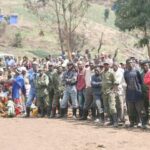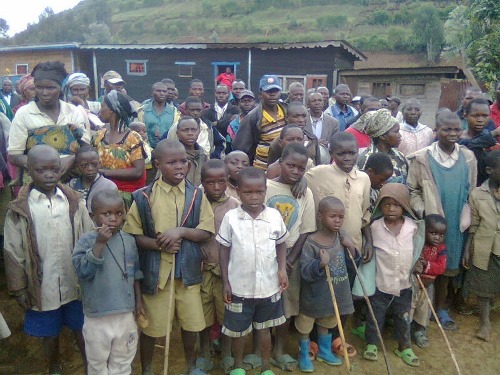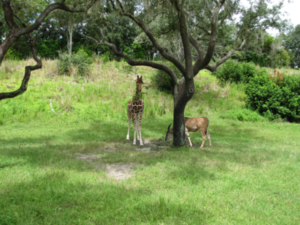Situation in Eastern DRC: The Time to Revisit the Jan 27, 2009 Accord Between the National Democratic Congress (NDC) and DRC Government is Overdue.
The Eastern Democratic Republic of the Congo is once again put to fire and sword by various militias and warlords, most the backing from foreign governments. According to non government organizations on the ground, the humanitarian toll has reached catastrophic proportions as the World body is trying to figure out what to do. Yet, three years ago, on January 27, 2009 the government of the Democratic Republic of the Congo and the leaders of the National Democratic Congress (NDC) signed an agreement that proposed a roadmap that arguably constitutes to date the best solution to resolve the on-going impasse, prevent such catastrophes and create conditions for fostering peaceful, stable and prosperous societies in the Great Lakes Region of Africa. The compelling roadmap was mediated and supported by three of the most reputable organizations renown for their proven peace initiatives and their knowledge of the political and social landscape in Great Lakes Region of Africa: Sant’ Egidio Community, Senter for interkulturell kommunikasjon – SIK ( SIK-Norway and Eglise du Christ au Congo (ECC-Congo).
- THE POSITION OF THE NATIONAL DEMOCRATIC CONGRESS (NDC) ON THE CONFLICT IN EASTERN DRC
The National Democratic Congress (NDC) is the coalition between the Rally for Unity and Democracy (RUD-Urunana) and the Rally of the Rwandan People (RPR). The NDC hence has an intimate knowledge of the region and an extensive experience with the Rwandan refugees in the Great Lakes region of Africa. If there is an initiative that has the best chance of resolving the impasse in Eastern DRC, NDC, based on its tested experience and the knowledge of the issues at hand, remains confident of its ability to formulate, plan and execute such an approach.
The NDC believes that the use of military force to resolve conflicts,in general, and in the Democratic Republic of the Congo, in particular, is not the right approach. Military options have failed in the past and have very limited chances of success, now and in the future.
For having tried and made significant advances in the right direction and reached a phase never attained by anyone before and to date, despite facing and confronting gravitational forces at each step and on several occasions, NDC has come up with and developed pragmatic and actionable solutions. In the following paragraphs, we outline the framework of a better approach based on our own intimate knowledge of the region and our experience.
2. MISSED OPPORTUNITIES
2.1. After arduous negotiations between the leaders of the government of the Democratic Republic of the Congo and the leaders of the National Democratic Congress (NDC), a final peace agreement was signed in Rome on January 27, 2009, with the mediation of Sant’Egidio, ECC and SIK-Norway. The peace agreement provided for the following:
2.1.1. Renewal of the commitment to peace in the Great Lakes Region in general, the DRC in particular.
2.1.2. Renewal of the persistent calls to the International Community to engage the Rwandan Government in order to create conditions for the peaceful repatriation of refugees and to open a dialogue with its opposition.
2.1.3. Request that the UN Secretary General appoints a Special Representative for Rwandan Refugees in the Great Lakes Region of Africa, as this constitutes the best way towards a timely and durable resolution of the impasse.
2.1.4. Readiness by NDC leaders to meet the Rwandan Government leaders, with the facilitation of the UN Secretary General Special Representative, to discuss the security guaranties and the participation of all Rwandan citizens in the political, social, and economical management of their nation.
2.2. The 2008-2009 Rome and Kisangani initiatives between the National Democratic Congress (NDC) and the DRC government, with the mediation of Sant’Egidio Community and SIK Norway, provided for, as a next step, tackling the issue of the all Rwandan refugees in the DRC, using the successes of the Kasiki disarmament of RUD and RPR troops as a springboard. Unfortunately, the subsequent attack of the Kasiki refugee camps by a coalition of Rwandan Defense Forces and FARDC, thwarted an initiative that had the best chances of not only resolving once for all the problems of Rwandan rebels in the DRC, but also contributing to lasting peace in the Great Lakes Region of Africa.
2.3. In consecutive months, until October 12, 2010, NDC members, close to the Rwandan combatants and refugees in eastern DRC and other interested partners within the International Community met on several occasions and shared a lot of different options to permanently eradicate the phenomenon of the foreign combatants in the DRC. They developed an action plan which includes a simple, fast, efficient and acceptable solution. Unfortunately once again some key people not interested in peace have actively sough to thwart the initiatives, thus falling in the trap of the Rwandan government which seeks to maintain the phenomenon of Rwandan rebels in order to justify its military and looting adventures in the Democratic Republic of the Congo.
2.4. To our knowledge, discrete contacts at the highest level of the Democratic Republic of Congo to solve the problem of the foreign combatants have never stopped until recently. The contacts sometimes involve people close to or the relatives of foreign combatants and refugees, on the one side, and DRC authorities and European actors, on the other. Earlier last year, President Joseph Kabila publicly acknowledged such contacts. Some of these contacts have led to concrete and satisfactory results and many go under the radar. Unfortunately the Rwandan government, less interested in the peaceful resolution of the Rwandan refugees problem, has invested all the efforts to impede such initiatives. Even as the situation deteriorated this year, similar peace efforts were in the making.
3. SAME OLD FAILED SOLUTIONS PROPOSED BY EXPERTS TO PERSISTENT PROBLEMS
There is recurrent theme in the reports by some experts, NGO and international organizations that the situation in the DRC calls for military solutions. Hence, these experts and organizations advocate for military interventions and other forced and conflictual initiatives to resolve the problem of refugees and to stabilize the political and social upheaval in Eastern DRC. These propositions rely on solutions that never worked before and have no reason to work in the future. The latest mutinies, rebellions and warlords are the epitome of such failed propositions. Let us repeat it again: military options in the Great Lakes region of Africa have failed in the past and has very limited chances of success now and in the future.
4. APPROACH PROPOSED BY NATIONAL DEMOCRATIC CONGRESS (NDC).
Let us say, first and foremost, that NDC, like many NGO, political analysts and experts on the region, believes that the root cause of the impasse in Eastern DRC is the political situation in Rwanda. Rwanda is where solutions must be found and applied. The NDC also believes that the chaos caused by wars in the Eastern DRC constitutes a serious threat to World peace and security.
Hence, the balance between urgency and pragmatism has led NDC to put forward a phased approach that includes immediate and long term actions:
4.1. Action 1: The UN Security Council needs to send a clear message to the Rwandan and DRC governments that it is in the World security and other interests that the problem of Rwandan rebels and refugees and Congolese militias and warlords be resolved once for all.
4.2.Action 2: Voluntary and peaceful disarmament of Rwandan rebels and combatants and potential repatriation and/or resettlement. This action requires a process agreed upon among the Rwandan government , the leaders of Rwandan refugees, and the DRC Government and the Representative of the UN Secretary General.
4.3.Action 3: Democratization process within Rwanda. An Inter-Rwandan dialogue will kickstart the process with the aim of ensuring the participation of all Rwandan citizens in the political, social, and economical management of their nation.
4.4.Action 4: Regional integration.
The NDC stands by the agreement NDC leaders signed with the DRC Government representatives during the 2008-2009 Rome and Kisangani process. Since 2008 NDC addressed communications to or contacted Government officials, members of the UN Security Council, NGO, and Human Rights organizations close to the situation of refugees in the Great Lakes Region, exhorting them to adopt a proactive approach.
The NDC reiterates its persistent calls on the International Community and the Government of Rwanda to promote peaceful solutions over senseless wars and bloodbath.
May 22, 2012.
Felicien Kanyamibwa, PhD.
President, National Democratic Congress (NDC).
Congrès National pour la Démocratie
National Democratic Congress
Email: urunana@optonline.net
url: www.rud-urunana.org
—————————————-









